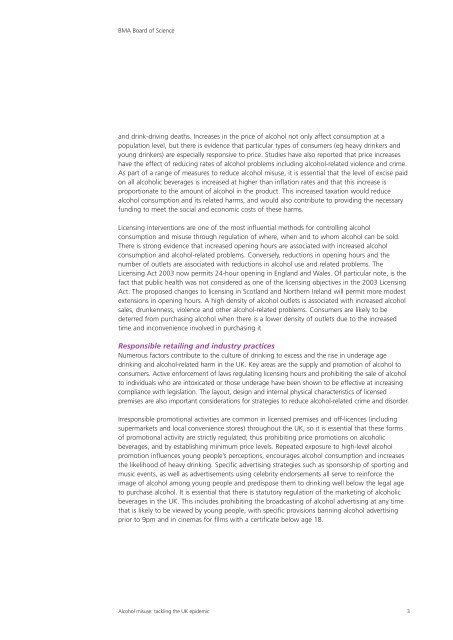Alcohol misuse: tackling the UK epidemic - London
Alcohol misuse: tackling the UK epidemic - London
Alcohol misuse: tackling the UK epidemic - London
Create successful ePaper yourself
Turn your PDF publications into a flip-book with our unique Google optimized e-Paper software.
BMA Board of Science<br />
and drink-driving deaths. Increases in <strong>the</strong> price of alcohol not only affect consumption at a<br />
population level, but <strong>the</strong>re is evidence that particular types of consumers (eg heavy drinkers and<br />
young drinkers) are especially responsive to price. Studies have also reported that price increases<br />
have <strong>the</strong> effect of reducing rates of alcohol problems including alcohol-related violence and crime.<br />
As part of a range of measures to reduce alcohol <strong>misuse</strong>, it is essential that <strong>the</strong> level of excise paid<br />
on all alcoholic beverages is increased at higher than inflation rates and that this increase is<br />
proportionate to <strong>the</strong> amount of alcohol in <strong>the</strong> product. This increased taxation would reduce<br />
alcohol consumption and its related harms, and would also contribute to providing <strong>the</strong> necessary<br />
funding to meet <strong>the</strong> social and economic costs of <strong>the</strong>se harms.<br />
Licensing interventions are one of <strong>the</strong> most influential methods for controlling alcohol<br />
consumption and <strong>misuse</strong> through regulation of where, when and to whom alcohol can be sold.<br />
There is strong evidence that increased opening hours are associated with increased alcohol<br />
consumption and alcohol-related problems. Conversely, reductions in opening hours and <strong>the</strong><br />
number of outlets are associated with reductions in alcohol use and related problems. The<br />
Licensing Act 2003 now permits 24-hour opening in England and Wales. Of particular note, is <strong>the</strong><br />
fact that public health was not considered as one of <strong>the</strong> licensing objectives in <strong>the</strong> 2003 Licensing<br />
Act. The proposed changes to licensing in Scotland and Nor<strong>the</strong>rn Ireland will permit more modest<br />
extensions in opening hours. A high density of alcohol outlets is associated with increased alcohol<br />
sales, drunkenness, violence and o<strong>the</strong>r alcohol-related problems. Consumers are likely to be<br />
deterred from purchasing alcohol when <strong>the</strong>re is a lower density of outlets due to <strong>the</strong> increased<br />
time and inconvenience involved in purchasing it.<br />
Responsible retailing and industry practices<br />
Numerous factors contribute to <strong>the</strong> culture of drinking to excess and <strong>the</strong> rise in underage age<br />
drinking and alcohol-related harm in <strong>the</strong> <strong>UK</strong>. Key areas are <strong>the</strong> supply and promotion of alcohol to<br />
consumers. Active enforcement of laws regulating licensing hours and prohibiting <strong>the</strong> sale of alcohol<br />
to individuals who are intoxicated or those underage have been shown to be effective at increasing<br />
compliance with legislation. The layout, design and internal physical characteristics of licensed<br />
premises are also important considerations for strategies to reduce alcohol-related crime and disorder.<br />
Irresponsible promotional activities are common in licensed premises and off-licences (including<br />
supermarkets and local convenience stores) throughout <strong>the</strong> <strong>UK</strong>, so it is essential that <strong>the</strong>se forms<br />
of promotional activity are strictly regulated; thus prohibiting price promotions on alcoholic<br />
beverages, and by establishing minimum price levels. Repeated exposure to high-level alcohol<br />
promotion influences young people’s perceptions, encourages alcohol consumption and increases<br />
<strong>the</strong> likelihood of heavy drinking. Specific advertising strategies such as sponsorship of sporting and<br />
music events, as well as advertisements using celebrity endorsements all serve to reinforce <strong>the</strong><br />
image of alcohol among young people and predispose <strong>the</strong>m to drinking well below <strong>the</strong> legal age<br />
to purchase alcohol. It is essential that <strong>the</strong>re is statutory regulation of <strong>the</strong> marketing of alcoholic<br />
beverages in <strong>the</strong> <strong>UK</strong>. This includes prohibiting <strong>the</strong> broadcasting of alcohol advertising at any time<br />
that is likely to be viewed by young people, with specific provisions banning alcohol advertising<br />
prior to 9pm and in cinemas for films with a certificate below age 18.<br />
<strong>Alcohol</strong> <strong>misuse</strong>: <strong>tackling</strong> <strong>the</strong> <strong>UK</strong> <strong>epidemic</strong> 3
















